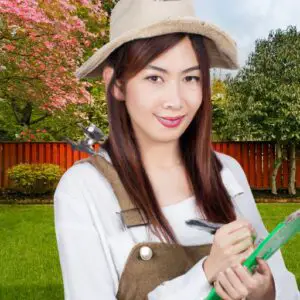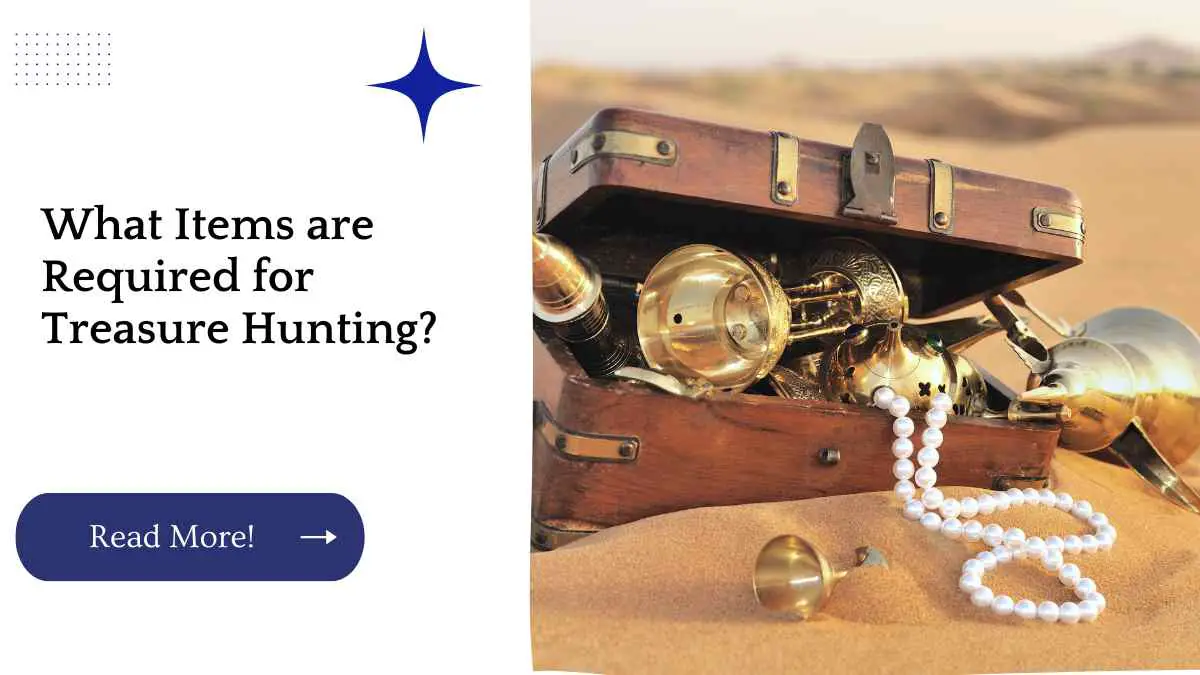Treasure hunting is a fascinating activity that has been around for centuries. It involves searching for valuable items that have been hidden or lost, such as coins, jewelry, artifacts, and other treasures.
However, for you to be successful in your treasure hunt, you need to have the right equipment and tools. In this article, we will discuss the essential items that are required for treasure hunting.
| Key Takeaways |
|---|
| Metal detector is essential for treasure hunting |
| Shovel, headphones, and pinpointer are also necessary |
| Proper clothing, GPS device, and sunscreen are recommended |
| Permission or permit is required before starting a hunt |
Metal Detector
A metal detector is the most important tool for treasure hunting. It is an electronic device that detects the presence of metal objects buried underground.
Metal detectors work by transmitting an electromagnetic field into the ground, and when the field comes into contact with a metal object, it creates a signal that is detected by the detector’s coil.
Types of Metal Detectors
There are various types of metal detectors, including:
- VLF (Very Low Frequency) detectors: These are the most common types of metal detectors and are suitable for most treasure hunting activities.
- PI (Pulse Induction) detectors: These are ideal for deep searching and are commonly used in beach hunting and gold prospecting.
- BFO (Beat Frequency Oscillation) detectors: These are the most basic types of metal detectors and are suitable for beginners.
When it comes to metal detecting, using the right detector for your skill level and needs is important. If you’re just starting out, be sure to read our beginner’s guide on how to start treasure hunting to get a better understanding of what kind of metal detector you should be looking for.
Features to Consider When Buying a Metal Detector
When buying a metal detector, you need to consider various features, including:
- Frequency: This refers to the number of times the electromagnetic field is transmitted and received per second. The higher the frequency, the more sensitive the detector is to small objects.
- Sensitivity: This refers to the detector’s ability to detect small or deeply buried objects.
- Discrimination: This is the detector’s ability to distinguish between different types of metals and ignore unwanted objects such as trash and bottle caps.
- Coil size: This determines the depth and coverage area of the detector.
Shovel
A shovel is necessary for digging and uncovering the treasure. You need a sturdy and durable shovel that can handle the soil conditions in your area. A shovel with a serrated edge can also be useful for cutting through roots and tough soil. You should also consider the weight and size of the shovel for easy transportation during your treasure hunt.
Headphones
Headphones are another essential item for treasure hunting. They can help you hear faint signals and reduce external noise that can interfere with your search. Headphones can also protect your hearing from the loud signals emitted by the metal detector. Look for headphones that are comfortable to wear and have a long cord for ease of movement.
Before starting any new hobby, it’s important to consider whether it’s worth your time and energy. To learn more about whether treasure hunting is worth it, check out our article on is treasure hunting worth it, where we break down the potential costs and benefits of the hobby.
Pinpointer
A pinpointer is a useful tool for locating the exact location of the target. It is a small handheld device that emits a signal when it comes into contact with a metal object. A pinpointer can help you narrow down the search area and save time during the digging process. Look for a pinpointer that is waterproof and has a sensitivity control feature.
Pouch or Bag
A pouch or bag is necessary for carrying your finds and other accessories. Look for a durable and lightweight pouch that has enough space to carry your metal detector accessories, snacks, and water. You can choose from different types of pouches, including belt pouches, shoulder pouches, and backpacks.
Gloves
Gloves can protect your hands from cuts, bruises, and other injuries during the treasure hunt. They can also provide better grip and prevent blisters when using the shovel or pinpointer. Look for gloves that are comfortable to wear and have a good grip.
Clothing and Footwear
Proper clothing and footwear can ensure your safety and comfort during the treasure hunt. Wear comfortable and breathable clothing that can protect you from the sun, insects, and thorny bushes. Look for sturdy and waterproof footwear that can handle the terrain in your area.
Choosing the right metal detector is crucial when it comes to successful treasure hunting. If you’re trying to decide between the Fisher F22 and F44 models, check out our comparison article on Fisher F22 vs F44 to see which one is right for you.
GPS Device
A GPS device can help you navigate and find your way during the treasure hunt. Look for a handheld GPS device that is easy to use and has a long battery life. You can also consider using a smartphone GPS app that can help you track your location and mark your finds.
Compass
A compass can be a useful backup tool for navigation during the treasure hunt. It can help you find your way if your GPS device fails or runs out of battery. Look for a compass that is durable and has a clear and easy-to-read dial.
Sunscreen and Insect Repellent
Sunscreen and insect repellent can protect you from the harmful effects of the sun and insects during the treasure hunt. Look for a broad-spectrum sunscreen that has an SPF of at least 30 and is water-resistant. Choose an insect repellent that contains DEET or other active ingredients that are effective against mosquitoes and ticks.
First Aid Kit
A first aid kit is essential in case of any injuries or accidents during the treasure hunt. Your first aid kit should include basic items such as bandages, antiseptic wipes, pain relievers, and tweezers. You should also consider including items such as a snake bite kit and a tourniquet in case of emergency.
Water and Snacks
Water and snacks are necessary to keep you hydrated and energized during the treasure hunt. Bring enough water to last you for the entire hunt, and consider bringing snacks such as energy bars and fruit to keep your energy levels up.
Conflict resolution is an essential skill for treasure hunters working with others. To learn more about how crystals can help with this process, check out our guide on crystal healing for conflict resolution.
Permission or Permit
You need to obtain permission or a permit before embarking on a treasure hunt. Check with local authorities, landowners, or park rangers to ensure that you are allowed to hunt in the area. Some areas may have restrictions or regulations that you need to follow.
Conclusion
Treasure hunting is an exciting activity that requires the right equipment and tools to be successful. In this article, we have discussed the essential items that are required for treasure hunting, including a metal detector, shovel, headphones, pinpointer, pouch or bag, gloves, clothing and footwear, GPS device, compass, sunscreen and insect repellent, first aid kit, water and snacks, and permission or permit.
By having these items, you can increase your chances of finding valuable treasures and make your treasure hunt more enjoyable and safe. Remember to always follow local regulations and obtain permission before starting your treasure hunt. Happy hunting!
Utilizing crystals for their healing properties is becoming increasingly popular. If you’re interested in learning more about how crystals can be used for healing, check out our beginner’s guide on healing with crystals to get started on your journey.
FAQs
What is the best type of metal detector for treasure hunting?
The best type of metal detector for treasure hunting depends on the type of treasure you are searching for and the soil conditions in your area.
VLF detectors are the most common and versatile types of metal detectors and are suitable for most treasure hunting activities. PI detectors are ideal for deep searching, while BFO detectors are the most basic and suitable for beginners.
Do I need a pinpointer for treasure hunting?
While a pinpointer is not necessary for treasure hunting, it can be a useful tool for locating the exact location of the target and saving time during the digging process. A pinpointer can help you narrow down the search area and prevent you from damaging the target during the digging process.
Do I need a GPS device for treasure hunting?
A GPS device is not necessary for treasure hunting, but it can be a useful tool for navigation and finding your way during the treasure hunt. A GPS device can also help you mark your finds and track your progress during the hunt.
What should I wear for treasure hunting?
You should wear comfortable and breathable clothing that can protect you from the sun, insects, and thorny bushes. Sturdy and waterproof footwear is also essential for handling the terrain in your area. It is also advisable to wear gloves to protect your hands from cuts, bruises, and other injuries during the treasure hunt.
Do I need a permit for treasure hunting?
Yes, you need to obtain permission or a permit before starting your treasure hunt. Check with local authorities, landowners, or park rangers to ensure that you are allowed to hunt in the area. Some areas may have restrictions or regulations that you need to follow to avoid fines or legal trouble.
Further Reading
What items are required for treasure hunting? – This Quora thread provides insights from treasure hunting enthusiasts on the essential items needed for successful treasure hunting.
Treasure Hunting Equipment: The Ultimate Buying Guide – This comprehensive guide provides detailed information on the different types of treasure hunting equipment, including metal detectors, pinpointer, shovel, and other accessories.
Treasure Hunting – Wikipedia – This Wikipedia page provides an overview of treasure hunting, its history, and its cultural significance. It also covers various techniques and technologies used in treasure hunting throughout history.

Hi there! My name is Hellen James, and I’m here to talk to you about treasure hunting. I’ve been a fan of treasure hunting ever since I was a kid, and if you’re a fan of treasure hunting or just like the idea of finding a long-lost fortune, then this blog is for you.

